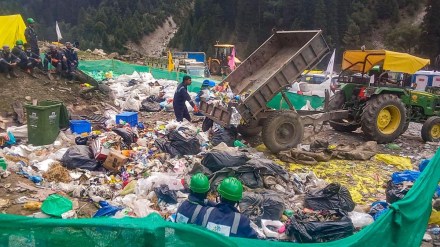Officials overseeing the annual Amarnath Yatra reported the successful collection and management of 114.57 tons of waste from the pilgrimage routes in the south Kashmir Himalayas. This initiative, aimed at ensuring an “eco-friendly yatra”, has set a new standard in sanitation practices since its commencement on June 29.
“Since the beginning of the yatra, we have managed to collect a cumulative total of 114.57 tons of waste, with 85.72 tons already processed and 27.43 tons identified as inert waste,” stated an official overseeing the sanitation efforts. This comprehensive waste management strategy includes handling plastic, wet and inert waste along the entire pilgrimage route.
The pilgrimage, spanning 52 days, attracts thousands of devotees to the holy cave shrine housing a naturally formed ice-shiva lingam at an elevation of 3,880 meters. Pilgrims traverse two main tracks: the 48-kilometre Nunwan-Pahalgam route in Anantnag and the shorter yet more challenging 14-kilometre Baltal route in Ganderbal.
Under the guidance of the Directorate of Rural Sanitation, part of the rural development and panchayati raj department, over 7,000 sanitation workers have been deployed since June 27. Their efforts are crucial in maintaining cleanliness and adhering to a strict zero-landfill policy along both pilgrimage routes. This holistic approach integrates manpower, machinery, maintenance, monitoring, and motivation to ensure sustainable sanitation practices.
A significant portion of the collected waste includes 43.30 tons of plastic, which has been compacted and stored at designated sites for proper disposal and recycling. The remaining 43.85 tons of wet waste are undergoing composting to produce high-quality manure, supporting organic farming initiatives in the region.
Inert waste, totaling 27.43 tons, has been responsibly managed, with 24 tons safely disposed of at the Achan dumping site of the Srinagar Municipal Corporation. An additional three tons of inert waste are earmarked for further processing through compactors, ensuring minimal environmental impact.
“These waste management initiatives are integral to our commitment to preserving the sanctity and cleanliness of the pilgrimage routes,” emphasized Anoo Malhotra, Director General of Rural Sanitation. She praised the collaborative efforts of sanitation teams, local authorities, and volunteers, whose dedication has been instrumental in achieving these milestones.
(With inputs from PTI)
